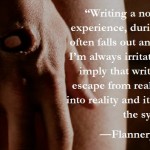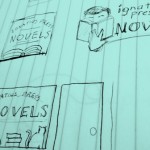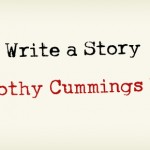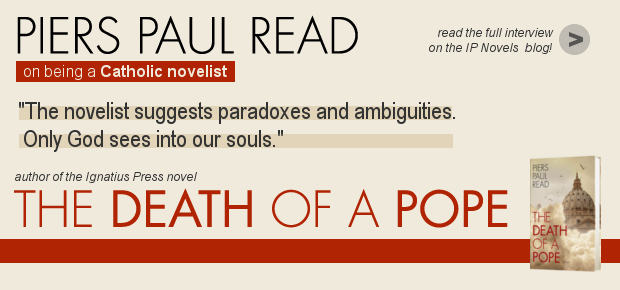Things tagged creativity
Articles
-

When I was a child I was extremely skinny—not much in the way of extra fat anywhere. It wasn’t something I noticed much about myself until I started going to swim class, and in the beginners’ lessons found that I really didn’t float easily like the teacher said I would…. Read more »
-

I’m fortunate. Much of my day job includes creative work, including graphic design, illustration, and writing. So even when I don’t have time at the end of the day to work on personal projects, I usually still had some small bit of creative work to look back on. (The unfortunate… Read more »
-

Not long ago, a former student asked me when I had first ‘gotten serious’ about writing stories. This, of course, is a ‘loaded’ question, and so I replied that I no longer remembered. At my age, now seventy-three, you can get away with evasions like that. In truth, it was… Read more »
-

When we encounter the works of Dickens, Waugh, Eliot, and O’Connor; Beethoven, Mozart, and Tchaikovsky; Da Vinci, Rembrandt, and Picasso, we are amazed at the abundance of creativity, far surpassing that of “mere mortals”, art so sublime, so beautiful, so moving, that we can only marvel at it. So why… Read more »
-

Flannery O’Connor suffered from lupus. C.S. Lewis lost his young wife to cancer after only 4 years of marriage. There is a theory that G.K. Chesterton suffered from developmental coordination disorder. J.R.R. Tolkien contracted trench fever while serving in World War I, and continued to have bouts of illness throughout… Read more »
-

Last week I wrote a bit about the creative process and how you must persevere past the “gap” between what you desire to create and what you can create. I thought I’d follow up with a quick post on one of the biggest enemies of creativity: comfort. Man craves comfort,… Read more »
-

When I first started working in graphic design, there was one book in particular that I wanted to design a cover for: Manalive by G.K. Chesterton. I even created some mock covers that have thankfully vanished in the mists of time. I wasn’t ready at that time to design a… Read more »
-

A few weeks ago, I took two of my children to the Legion of Honor museum here in San Francisco. My oldest, age six, is on the autism spectrum. We’d been to the museum before. Last time he had been so quickly overwhelmed that we had had to leave after… Read more »
-

I am a writer. I write almost every day. Inspired by a strict Presbyterian friend, I have chosen not to write on Sundays. Although I make money through writing, I do not make very much. Apart from blogging, I make the least amount of money by writing fiction. In the… Read more »
-


Piers Paul Read is perhaps best known for his non-fiction account of the 1972 airline disaster involving Uruguayan Air Force Flight 571, a plane carrying 45 passengers that crashed in the Andes. His book, Alive: The Story of the Andes Survivors, became a world-wide bestseller and, in 1993, was made into a film starring Ethan Hawke.
Mr. Read is also an accomplished novelist and playwright, as well as a journalist, biographer, and social commentator. His recent works include the novels Knights of the Cross and Alice in Exile, and the non-fiction titles The Templars: The Dramatic History of the Knights Templar; Alec Guinness: The Authorised Biography; and Hell and Other Destinations.
Piers Paul Read’s novel, The Death of a Pope, has garnered acclaim from fellow novelists Ron Hansen and Ralph McInerny. A thriller that intertwines real events with fiction, The Death of a Pope touches on many themes that are hot-button issues in the Catholic Church and the world today.
(Note: this interview was originally published in 2009 in conjunction with the release of The Death of a Pope.)
What inspired you to write The Death of a Pope?
When I was young I was a zealous exponent of Liberation Theology. As I grew older I like to think I grew wiser and came to see how ‘social’ Catholicism, however superficially appealing in the face of the suffering caused by poverty and injustice, in fact falsifies the teaching of the Gospels. This is particularly true when it condones or even advocates the use of violence: as Pope Benedict XVI puts it in his encyclical Spe Salvi, “Jesus was not Spartacus, he was not engaged in a fight for political liberation”. Yet this was precisely the message preached from the pulpits in Catholic parishes and taught in Catholic schools in the last decades of 20th century. The two visions of what charity demands of a Christian confront one another on the issue of the AIDS epidemic in Africa. It is this confrontation that gave me the idea for my novel.
You’ve written quite a bit in both fiction and non-fiction. The Death of a Pope, though fiction, is interwoven with real events, situations, and ideological tensions. Do you see a clear line between what you create and the real world you’re drawing from?
I have always taken the view that a work of non-fiction should be just that, whereas anything is allowed in a novel. In Alive: The Story of the Andes Survivors, for example, there are snatches of dialogue which may not use the precise words used by the characters but they are not invented: the exchanges come from my interviews with the survivors.
As a novelist I am a realist and use actual events and institutions to add verisimilitude to the story. There is a danger of tipping the novel into a kind of fictionalised journalism, but that is avoided if the story itself comes from the imagination and the fictional characters have distinct personalities and convincing motives for what they do.
The Death of a Pope begins with a series of quotes, including one from Polly Toynbee from the UK paper The Guardian, claiming that “The Pope kills millions through his reckless spreading of AIDS.” Is this an attitude that is widespread in journalism today?
The pope that Polly Toynbee had in mind was Pope John Paul II but she would level the same charge, after his air-born press conference on the way to Africa in March, 2009, at Pope Benedict XVI. Toynbee is an atheist and militant secularist, and she sees in Catholic misgivings about the use of condoms to prevent the spread of AIDS a stick with which to beat the Church. Her views are widely shared in the secular media, even if they are not so pungently expressed. Liberal Catholics, too, such as the late Hugo Young — a highly influential columnist — sometimes adopted this secularist outlook: he talked of the record of Pope John Paul II as “an offence against elementary tenets of liberal decency”.
In a way, The Death of a Pope is quite critical of the more radical form in which Liberation Theology can manifest itself. Is this based on your own experience with radicalism when reporting from El Salvador?



